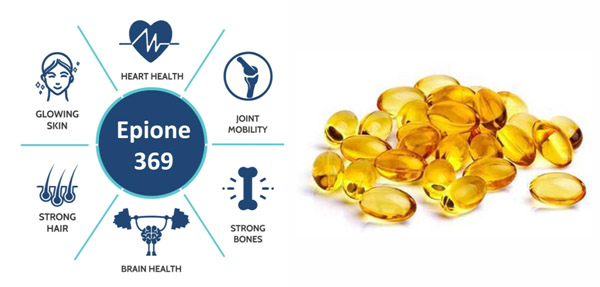What is Flaxseed ?
Flaxseed is one of the oldest crops, having been cultivated since the beginning of civilization. The Latin name of the flaxseed is Linum usitatissimum, which means “very useful”. It is a blue flowering annual herb that produces small flat seeds varying from golden yellow to reddish brown color. Flaxseed possesses crispy texture and nutty taste. Flaxseed is used to describe flax when consumed as food by humans while linseed is used to describe flax when it is used in the industry. Flaxseed has been the focus of increased interest in the field of diet and disease research due to the potential health benefits associated with some of its biologically active components. Flaxseeds have nutritional characteristics and are rich source of Omega 3, 6 & 9 fatty acid: α-linolenic acid (ALA), linolenic acid, oleic acid, short chain polyunsaturated fatty acids (PUFA), soluble and insoluble fibers, phytoestrogenic lignans (secoisolariciresinol diglycoside-SDG), proteins and antioxidants. Flaxseed oil, fibers and flax lignans have potential health benefits such as in reduction of cardiovascular disease, atherosclerosis, diabetes, cancer, arthritis, osteoporosis, autoimmune and neurological disorders. Flax protein helps in the prevention and treatment of heart disease and in supporting the immune system.

Importance of Flaxseed
- Flax Seeds Are Loaded With Nutrients.
- Flax Seeds Are High in Omega-3,6 & 9 Fatty acid.
- Flax Seeds helps Improve good Cholesterol.
- Flax Seeds helps Lower Blood Pressure.
- Has powerful antioxidant property.
- Has powerful anti-inflammatory action.
- Posses anti-fungal action.
- Improves condition of poor & dry skin.
- Provides Neuroprotective effect.
- Improves the condition in dry eye syndrome.
- Helps in hormonal balance of the body.
- Flax Seeds Are a Rich Source of Lignans, Which Reduces Cancer Risk.
Chemical Constituents of Flaxseed
The nutritional value and functional properties of flaxseed Linum Usitatissimum L. are analyzed. There are three groups of compounds in the flaxseeds, characterized by specific biological activity and functional properties: PUFA omega 3,6 & 9 fatty acids, soluble dietary fiber in the form of mucus, and lignans, which have phytoestrogen properties. The flaxseeds contain 35-45% oil, which contains 9-10% of saturated fatty acids (palmitic and stearic), about 20% monounsaturated fatty acids (mainly oleic acid), and more than 70% alpha-linolenic fatty acids acid. The protein content in seeds of flax varies from 20-30%.
Omega 3 fatty acids ?
Omega 3 fatty acids are α-linolenic acid (ALA). ALA is found mainly in plant oils such as flaxseed, soybean, and canola oils. ALA is an essential fatty acid, meaning that our body can’t make it, so we must get it from the foods and beverages we consume. Omega-3s are important components of the membranes that surround each cell in our body. DHA levels are especially high in retina (eye), brain, and sperm cells. Omega-3s also provide calories to give our body energy and have many functions in our heart, blood vessels, lungs, immune system, and endocrine system (the network of hormone-producing glands). A deficiency of omega-3s can cause rough, scaly skin and a red, swollen, itchy rash.
Benefits of omega 3
- Helps Fight Depression and Anxiety.
- Improves Eye Health.
- Helps Promote Brain Health During Pregnancy and Early Life.
- Improves Risk Factors for Heart Disease.
- Reduces Symptoms of ADHD in Children.
- Reduces Symptoms of Metabolic Syndrome.
- Helps Fight Inflammation.
- Helps Fight Age-Related Mental Decline and Alzheimer’s Disease.
- Helps Prevent Cancer.
- Reduces Fat in Liver.
- Improves Bone and Joint Health.
- Alleviates Menstrual Pain.
- Good for our Skin.

Omega 6 fatty acids ?
Benefits of omega 6 fatty acids
- Reduces inflammation of rheumatoid arthritis.
- Good For our Skin.
- Helps Prevent Cancer.
- Improves Risk Factors for Heart Disease.
- Helps improve immune response.
- Decreases risk of blood clots.
- Promotes cell growth.
- Reduces Brest pain.
- Helps in hormonal balance.
Omega 9 fatty acids ?
Benefits of omega 9 fatty acids
- Increases HDL (“good”) cholesterol and decrease LDL (“bad”) cholesterol.
- Helps eliminate plaque build- up in the arteries which causes heart attack and stroke.
- Helps Fight Inflammation.
- Improves Bone and Joint Health.
- Helps healing faster.
- Helps in hormonal balance.
What is Epione 369 ?
Epione 369 contains: Flax seed oil 500 mg / capsule (Alpha Linolenic Acid 253 mg + Linolenic Acid 88.3 mg + Oleic acid 21.3 mg) Although omega-3, omega-6, and omega-9 fatty acids all serve different functions within the body, incorporating balanced proportions of both essential and non-essential fatty acids are necessary for maintaining overall heart health and general wellness. Adults should receive 20-35 percent of energy from dietary fats, avoiding saturated and trans (“bad”) fats, and increasing omega-3 6 9 fatty acids. Administration of Epione 369 increases compliance with dietary recommendations for fatty acids, particularly in lowering saturated fat and increasing heart-healthy monounsaturated fat.

Epione 369 in Cardiac Management
Epione 369 contains omega-3 6 9 fatty acids are a type of Healthy fatty acids that may reduce inflammation throughout the body. Inflammation in the body can damage our blood vessels and lead to heart disease and strokes.
- Epione 369 benefits heart health by:
- Decreasing triglycerides.
- Lowering blood pressure.
- Reducing blood clotting.
- Decreasing risk of strokes and heart failure risk.
- Reducing irregular heartbeats.
- Increasing HDL (“good”) cholesterol and decrease LDL (“bad”) cholesterol.

Epione 369 in Arthritic Problems
Epione 369 contains:
Epione 369 in Arthritic Problems:
Omega-3 6 9 fatty acids are well-known for their ability to reduce inflammation, and those with rheumatoid arthritis (RA) may want to consider incorporating them into their management plan for that reason. Increased intake of omega-3 6 9 helps alleviate pain and stiffness, as well as protect joints from damage.
Benefits of Epione 369 in rheumatoid arthritis (RA):
Reduces inflammation:
Inflammation in the lining of the joints a type of tissue called the synovium is a cause of RA. Because omega-3 fatty acids lowers our body's production of inflammatory chemicals, Intake of omega-3 6 9 helps inhibit this inflammation and stop joint damage.
Influence immune activity:
Classified as an autoimmune disorder, RA occurs when the immune system mistakenly attacks the synovium. Omega-3 6 9 fatty acids helps regulate the immune response and prevent the attacks.

Epione 369 in Fungal Problems
Omega 3,6,9 exhibits antifungal properties against Alternaria solani, Candida albicans & Aspergillus flavus useful in skin problems like eczema, psoriasis, itching, skin lesions & rashes. The efficacy of omega 3 6 9 on microbial cell membranes and their antioxidant properties inhibits the growth of microorganisms and thereby promote human health. Omega-3 FAs can are considered as potential alternative or adjunctive therapeutic antifungal agents because of their antimicrobial and immunomodulatory properties.

Epione 369 in Skin Problems
Omega 3,6,9 fatty acids are truly remarkable ingredients for skin. They serve as the essential building blocks of skin’s surface layers, creating a smoother, more even, younger-looking, and healthier complexion, no matter your age or skin type.
Benefits of Epione 369 for skin & hair:
Reinforce and smooth skin’s surface.
Increases hydration and helps keep skin hydrated.
Calms signs of external stressors, including redness and sensitivity.
Visibly strengthen skin against signs of environmental damage.
Delivers antioxidants to visibly reduce fine lines and wrinkles.
Helps maintain good luster of the hair, Strengthens hair follicles & prevent hair loss.

